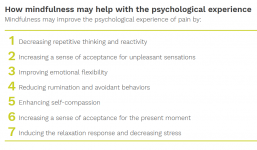David Baxter PhD
Late Founder
How Meditation Changes Pain, Relieves Depression
by Kelly McGonigal, Ph.D., Psychology Today
September 25, 2011
The more you focus on pain, the higher your pain tolerance.
It's not too often that my first response to pain is, "Fantastic!"
But when I collapsed to the ground after banging my ankle on a hardwood meditation bench, I knew this was an opportunity for a scientific experiment. I had spent the last few days preparing a talk on the neuroscience of meditation. More specifically, how meditators process pain differently than non-meditators.
The biggest difference? Meditators pay more attention to the direct sensation of pain. In laboratory studies that deliver painful stimulation, meditators' brains show more activity in areas associated with sensory processing (think: ankle throbbing!).
Non-meditators, on the other hand, showing more activity in areas associated with evaluation and language. It's the inner dialogue of "Holy $!%@ that hurts! I'm such a klutz! This stinks! When is it going to stop?"
Interestingly, the more a meditator's brain focuses on the pain experience, and the less activity in the evaluation system, the higher their pain tolerance. It's what we hear all the time from our wisest meditation teachers: Focus on the sensations, drop the story. It's the story that turns pain into suffering.
So as I felt my ankle swelling, I decided to try both techniques out. Let my inner "evaluator" go crazy with judgments about the pain -- then mindfully turn my attention to the breath and what I was feeling. I probably don't need to show you any fancy brain imaging pictures or data plots to convince you that indeed, mindfulness made the pain much more tolerable.
But if you do want to see fancy brain pictures and even fancier graphs, check out the video of my 20-min talk. It covers both physical pain and emotional pain, and the fascinating finding that what the brains of new meditators do to reduce suffering is the complete opposite of what experienced meditators do.
Talk title: What Science Can Teach Us About Practice
Presented at the Buddhist Geeks conference in Los Angeles, CA
by Kelly McGonigal, Ph.D., Psychology Today
September 25, 2011
The more you focus on pain, the higher your pain tolerance.
It's not too often that my first response to pain is, "Fantastic!"
But when I collapsed to the ground after banging my ankle on a hardwood meditation bench, I knew this was an opportunity for a scientific experiment. I had spent the last few days preparing a talk on the neuroscience of meditation. More specifically, how meditators process pain differently than non-meditators.
The biggest difference? Meditators pay more attention to the direct sensation of pain. In laboratory studies that deliver painful stimulation, meditators' brains show more activity in areas associated with sensory processing (think: ankle throbbing!).
Non-meditators, on the other hand, showing more activity in areas associated with evaluation and language. It's the inner dialogue of "Holy $!%@ that hurts! I'm such a klutz! This stinks! When is it going to stop?"
Interestingly, the more a meditator's brain focuses on the pain experience, and the less activity in the evaluation system, the higher their pain tolerance. It's what we hear all the time from our wisest meditation teachers: Focus on the sensations, drop the story. It's the story that turns pain into suffering.
So as I felt my ankle swelling, I decided to try both techniques out. Let my inner "evaluator" go crazy with judgments about the pain -- then mindfully turn my attention to the breath and what I was feeling. I probably don't need to show you any fancy brain imaging pictures or data plots to convince you that indeed, mindfulness made the pain much more tolerable.
But if you do want to see fancy brain pictures and even fancier graphs, check out the video of my 20-min talk. It covers both physical pain and emotional pain, and the fascinating finding that what the brains of new meditators do to reduce suffering is the complete opposite of what experienced meditators do.
Talk title: What Science Can Teach Us About Practice
Presented at the Buddhist Geeks conference in Los Angeles, CA

